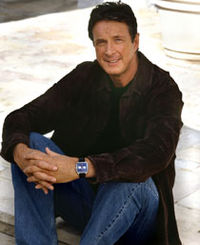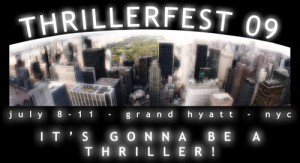Category Archives: James Rollins
More, more, more…
So like Clare, I’m currently out of town on vacation (nowhere as exotic as Australia, but I’m still enjoying a bit of a break from the San Francisco fog).
Last week I attended Left Coast Crime in LA, where I was fortunate to have the opportunity to catch up with John Gilstrap and James, and to meet Kathryn for the first time. Which was kind of shocking-the funny thing about blogging like this is how well you get to know each other without ever meeting face to face. For instance, I feel like Basil is practically family at this point (albeit as that crazy cousin who kicks off the conga line at family events). The post 9/11 literature panel that John and I were on made episodes of the Jerry Springer show look dull in comparison. In the bar afterward, almost every passerby stopped to tell John that they’d heard about his performance. He’s officially a legend now, and will probably start showing up late to our Denny’s meetings, if he makes them at all.
I got the chance to talk to Lee Child briefly at the conference (I know, I’m a shameless name dropper), and we were discussing the fact that for the first time he’s releasing not one but two books this year. This has become a trend with the recent industry downturn. It’s easier for publishers to push more books written by their stable of well known authors than to build up a new name, so old faithfuls like James Rollins, John Sandford, and of course James Patterson are being offered nice bonuses for increased productivity.
Even authors who aren’t household names are being urged to try to churn out multiple titles a year. Now, I’m not saying there aren’t people who do this well. But when my agent and I were negotiating my last contract, and they pushed for an increase to two or three books a year, I said no.
It’s a struggle for me to finish one book a year. It takes between 4-6 months for me to compose the initial draft, then I send it off to my editor and have a few weeks head start on the next book. Then the edits come back, and I have in general another month to polish it. At which point I mail it back, work a little bit more on the next book…just when I’m getting in the groove again, it’s time for round three. Add in the months I need to coordinate marketing for that book before its release, and it’s always about a year, start to finish. The thought of adding another book, never mind two, into the mix would be hive-inducing.
Yet many writers do manage to produce more than one book a year. Which raises a few questions for me. Firstly, does the quality suffer? Dennis Lehane claimed that the book a year grind made him feel like his work was deteriorating, so he took two full years off to write the next book- which turned out to be MYSTIC RIVER.
I also question whether or not having an author flood the market with books actually helps their sales if they’re not James Patterson or Stephen King. Is it better to come out with three books a year, rather than one? What does everyone think?
Now, back to the sun…
Notes from Thrillerfest
A Tribute to Michael Crichton

It’s been a tough few weeks for fiction. We’ve recently lost some of our greats, including Tony Hillerman, Elaine Flinn, and yesterday, Michael Crichton.
While I had never had the privilege of meeting Crichton, when I opened my Yahoo page and saw his obituary, I experienced the sort of shock you normally feel when you’ve lost an acquaintance.
May of 1993. I had just finished writing my senior thesis, a series of short stories based on my Grandfather’s WWI diaries. I actually finished the book a few days early, shockingly enough (and, as my editor would assure you, not at all true to form). Connecticut was in the full throes of spring, and on a warm, sunny day I brought a copy of Jurassic Park onto the lawn in front of the library and dove in. I generally didn’t read thrillers, but the back cover copy had lured me with the promise of a complete escape from the tomes I’d been struggling with for eight semesters.
And I was completely swept away. That book was such a breath of fresh air, I was riveted. What a genius concept: a theme park, with real dinosaurs created from ancient DNA preserved in amber. It hooked me, and from then on I was a devout thriller fan.
Despite the fact that I didn’t agree with all of his political stances, you have
to admire a man who never shied away from hot button issues. And Crichton undeniably possessed the Midas touch, prior to JK Rowling storming on to the scene he was the most successful author in the world. It can be argued that he not only revitalized the techno-thriller, paving the way for the success of Douglas Preston, Lincoln Child, and James Rollins, but he also made medical dramas sexy again with ER. In addition to his novels, he collaborated on screenplays for films like “Twister.” He was remarkably prolific, once claiming to churn out 10,000 words a day. As someone who considers herself fortunate to clock 10,000 words in a week, that’s simply staggering.
Not to mention the fact that he was once chosen as one of People’s 50 Most Beautiful People, a title that few writers have possessed (shall we call it the “paper ceiling?”)
A remarkable writer, and a remarkable person. He will be missed.


